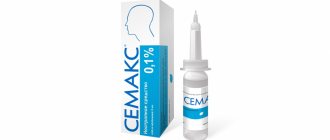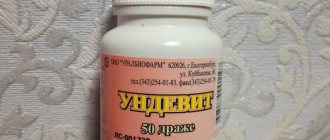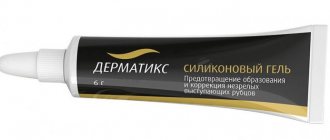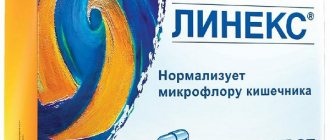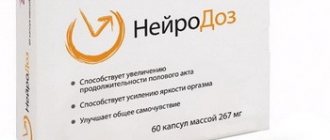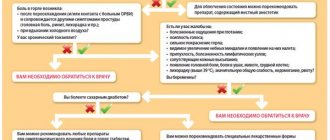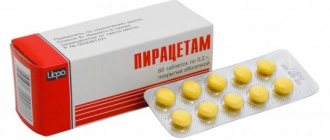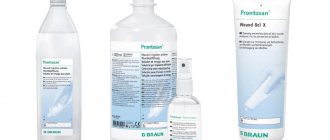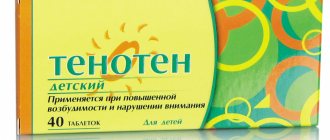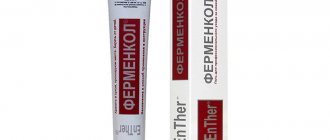Manufacturer: Kurortmedservis (Russia)
Active ingredients
- Not indicated. See instructions
Pharmacological action
- Calming
- Antispasmodic
- General strengthening
- Painkiller
- Description of the pharmacological action of Bayu-Bai - for children
- Composition of Bayu-Bai - for children
- Indications for use of the drug Bayu-Bai - for children
- Release form of the drug Bayu-Bai - for children
- Contraindications to the use of the drug Bayu-Bai - for children
- Method of administration and dosage of the drug Bayu-Bai - for children
- Overdose of Bayu-Bai - for children
- Special instructions when taking the drug Bayu-Bai - for children
- Storage conditions for the drug Bayu-Bai - for children
- Shelf life of Bayu-Bai - for children
Release form and composition of the drug
The medicine can be found on pharmacy shelves only in liquid form, that is, in the form of drops for oral use. The liquid has a dark brown color and a pronounced aroma of medicinal plants.
It is packaged in glass bottles of 25 ml. There are also volumes of 50 and 100 ml, but they are less popular if the drug is used to treat children. Each bottle is placed in an individual cardboard box and equipped with a dropper for easy dosing. In addition, in the box you can find instructions that similarly describe all the features of use and dosage regimen.
The composition contains several active components, due to which the therapeutic effect is achieved:
- Peppermint and chamomile extract.
- Extract from lemon balm and linden.
- Concentrated oregano extract.
It is due to the mixture of these components that the therapeutic effect is achieved. Auxiliary ingredients do not have beneficial properties, but are used to preserve the chemical composition of the product during its shelf life. Additionally, the composition contains glycerin, citric acid and magnesium lactate. The product contains sodium acetate as a preservative.
The amount of active and additional components per 1 ml of product is the same and does not depend on the volume of the bottle.
Pharmacological properties
Bayu-Bai drops for children, reviews of which are often contradictory, have pronounced sedative and hypnotic properties. The combination of several medicinal herbs helps to influence certain centers in the brain that are responsible for normal sleep.
As a result, the process of falling asleep is facilitated and the child’s general condition is improved due to deep, restful sleep.
Additionally, the medicine has immunostimulating properties, helps the body fight various diseases and prevent their progression. The choleretic and diuretic effect of the drug was noted, stimulating the elimination of toxins and harmful components from the body.
It is worth noting that the medicine has mild anti-inflammatory and antiseptic properties, which are due to the presence of medicinal chamomile in the extract. Drops also help eliminate mild pain in the stomach, headaches and toothaches.
There is a positive effect of the product on digestion and the mucous membranes of the digestive tract.
The drug also relieves smooth muscle spasms, which has a positive effect on the condition of the stomach and intestines. The complex effect on the body helps to cope with various sleep disorders, as well as some other disorders that accompany anxiety, restlessness and insomnia.
How effective are Bayu-Bai baby calming drops?
Of all the possible uses, these drops can be really effective during overexcitation of the baby, not associated with any disease of the nervous system, or in the complex treatment of alopecia, vegetative-vascular dystonia, allergic dermatitis or neurotic conditions. These drops are not a sleeping pill, they only have a calming effect. In addition, this dietary supplement is not a medicine; it does not cure the underlying disease, but provides symptomatic assistance. That is, if the baby is overexcited while playing, for example, in kindergarten, then Bayu-Bai drops will not help him calm down. However, if there is any disorder of the nervous system, then the dietary supplement will provide only symptomatic temporary help, but will not lead to a complete recovery. In case of sleep disturbance, Bayu-Bai drops are ineffective if this condition is caused by serious diseases.
Pharmacodynamics and pharmacokinetics
The pharmacological agent produces a therapeutic effect almost immediately after ingestion. This is due to the good absorption of active components into the blood from the stomach and small intestine.
Plant substances distribute well through the systemic bloodstream, bind to blood proteins and exert a therapeutic effect, reaching centers in the brain responsible for controlling the emotional state.
As a result, nervousness and anxiety are eliminated, sleep and the general condition of the patient are normalized. The product belongs to the group of biologically active food additives, therefore it has a complex effect on the body.
Mint extract has a mild sedative property. When it enters the body, the transmission of nerve impulses to cells slows down, which leads to the elimination of causeless fear and anxiety.
However, the remedy is effective not only for unspecified anxiety, but also for neuroses that are associated with the chronic course of dermatological diseases, as well as somatic disorders.
There is an increase in the effect of mint extract when combined with an extract from lemon balm leaves. The component prolongs the sedative effect of the medication and has a gentle effect on the central nervous system.
Chamomile extract has antispasmodic, anti-inflammatory and antiseptic properties, helps improve the functioning of all internal organs. As a result, the condition normalizes if the disorders were associated with somatic disorders.
Additionally, chamomile has a mild sedative effect, which persists only at night, but does not impair concentration during the day. It is noted that when taking the medicine, memory and concentration improve, and mental performance increases in adults and children of different ages.
The presence of oregano and linden extract in the composition allows the product to normalize blood pressure and body temperature, reduce heart rate, which increases with neuroses, insomnia and anxiety syndrome.
The complex effect of the product is considered relatively safe for the body. The supplement is not addictive like synthetic medications. This advantage makes it the most preferred option for children.
After oral use, the components of the product are quickly absorbed into the blood and have a therapeutic effect. The maximum concentration of substances in the blood is observed 30-40 minutes after administration.
The components bind well to blood proteins, which explains their high bioavailability. Herbal extracts are processed in the liver. Removal of breakdown products is carried out through the kidneys within 1 day after taking the last dose.
It is noted that the medication does not accumulate in tissues and organs and is completely eliminated from the body. This significantly reduces the risk of overdose.
Description of pharmacological action
It has a mild calming effect, helps restore all phases of sleep and morning activity, eliminates irritability, increases performance, mood, and analytical ability of the central nervous system, strengthens the nervous system, normalizes blood pressure, heart rate, and respiratory rate. Helps children adapt to school stress. The herbs included in the composition have a general strengthening, antispasmodic, analgesic, anti-inflammatory, diuretic and choleretic effect, and have a beneficial effect on the function of the gastrointestinal tract and urinary system. Long-term use does not cause addiction, dependence or withdrawal symptoms.
Indications for use
Bayu-Bai is used for various forms of insomnia. The drops are intended for children of different ages and adults, and reviews about them can be positive and negative, which is explained by the individual characteristics of each patient.
Main indications for prescribing the drug:
- Insomnia due to vegetative-vascular dystonia. At the same time, the medicine not only improves sleep, but also eliminates the most pronounced manifestations of the disease, which speeds up the recovery process.
- Neuroses provoked by chronic dermatological diseases. For dermatitis, eczema, psoriasis and other diseases, taking drops helps improve sleep and eliminate psycho-emotional stress. As a result, the symptoms of the underlying disease are suppressed.
- Sleep disorders of unspecified origin, when a lack of adequate rest provokes the development of various disorders.
- Intestinal colic in patients of preschool and school age.
- Atopic form of dermatitis with severe itching.
- Indigestion and indigestion.
- Hyperactivity in school-aged patients.
- Impaired concentration, memory impairment in schoolchildren.
The drug is considered effective not only for the treatment of various disorders, but also for the prevention of complications and recurrence of the disease. The immunostimulating properties of the drug promote the production of cells responsible for fighting pathogens, which also has a beneficial effect on the body and the functioning of internal organs.
Indications, contraindications
Neurological disorders in children accompanied by sleep disturbances are the main indication for use. A sedative is also prescribed in the presence of the following conditions:
- colic in the abdomen;
- hyperactivity;
- atopic dermatitis;
- vegetative-vascular dystonia;
- hair loss (alopecia).
They are often prescribed to school-age children to adapt to the educational process. They help cope with lack of sleep, bad mood, irritation, and apathy. In addition, it is used as a prophylactic agent to prevent depression.
Despite the natural composition, the drops are not recommended for use in children without a prescription from a pediatrician.
Individual intolerance to the components of the biological additive is one of the contraindications. Herbal extracts can trigger the development of allergies.
Cannot be used in children under three years of age. Sometimes drops are prescribed to babies up to one year old. In this case, the dosage regimen is determined by a specialist.
Contraindications
The medication is not used if you are allergic to its components or have a tendency to such manifestations. If a patient is diagnosed with a history of intolerance to one of the herbal components, taking drops is not recommended due to the increased risk of complications.
In severe cases of renal and liver failure, the drug is contraindicated, as it can lead to aggravation of disease symptoms.
The choleretic properties of the drug can negatively affect the condition of the gallbladder in patients who suffer from cholelithiasis. This is due to an increase in the outflow of bile and the movement of stones towards the bile ducts.
The official instructions indicate that the medicine cannot be used to treat patients under 3 years of age. In addition, the drug is contraindicated in pregnant and lactating women, adults and children with severe epilepsy.
Relative contraindications include the recovery period after surgical interventions on the abdominal organs, as well as after suffering from severe infectious diseases. In each case, the list of contraindications may increase depending on the individual characteristics of the body.
Composition of the herbal remedy
The composition of Bayu Bai drops is well balanced, developed on the basis of several plant components. 1 g of medicinal solution contains extracts:
- oregano;
- peony;
- motherwort;
- hawthorn fruit;
- peppermint.
Citric and glutamic acid are additional substances. Unlike most similar drugs, the drops do not contain valerian root extract or barbiturates. These components, on the contrary, can inhibit the functioning of the central nervous system, which is harmful.
At what age can the drug be used?
Bayu-Bai drops for children, reviews of which depend on the specific application of the product, are prescribed to patients over 3 years of age. This is stated in the official instructions for use of the medication.
However, in some cases, the drug is prescribed to babies under 1 year of age, but the dosage and duration of use is determined by the pediatrician individually for each child. Drops should not be used independently and without prior examination.
Instructions for use, dosage
The drug is used in different regimens depending on age and disease. The duration of the course also differs.
| Disease | Treatment regimen and dosage of the drug |
| Neuroses and insomnia of unspecified origin | For such a disorder, patients aged 3 to 7 years are prescribed 10 drops of the drug 2-3 times a day for 2 weeks. Patients from 7 to 11 years old take 15-20 drops 2 times a day. Children from 11 to 14 years old are recommended to take 25-30 drops of the product 2-3 times a day. Patients over 14 years of age and adults are prescribed 30 drops 3 times a day. The duration of therapy can be 2-4 weeks, but sometimes the course is extended to 6 weeks according to individual indications. |
| Sleep disturbance with vegetative-vascular dystonia | For such disorders, the dosage for patients 3-7 years old is 7 drops 3 times a day. Patients aged 7-11 years are advised to take 12 drops 3 times a day. Patients from 11 to 14 years of age are prescribed 20 drops three times a day, and children from 14 years of age and adults are prescribed 25 drops 3 times a day. The duration of treatment does not exceed 30 days. |
| Insomnia associated with chronic severe dermatological diseases | Patients under 7 years of age are prescribed 10 drops 2 times a day. Patients from 7 to 14 years old - 15 drops 3 times a day. Adults and children over 14 years of age take 20 drops 3 times a day. The course duration ranges from 15-20 days. |
| Prevention of sleep disorders and other abnormalities | If it is necessary to carry out prophylaxis, children of any age take the medicine in a reduced dosage, but for 4 weeks. This allows for a therapeutic effect but reduces the risk of complications. The single dose is 10 drops, they should be taken 3 times a day. |
Children from 2 months of age can be prescribed 3-5 drops before bedtime for 5-10 days. However, this dosage may vary depending on the child's condition and other characteristics. Pediatricians rarely prescribe the drug, since its effect on the body of a newborn has not been studied.
Drops should be placed under the tongue . After this, they are swallowed by the patient and enter the digestive tract. It is better to combine the intake with food, since the medicinal components are absorbed faster and have a pronounced effect.
If necessary, drops can be dropped onto a piece of bread or sugar and then dissolved, but this method is only suitable for children over 4 years old. Do not add the product to water, this may disrupt the chemical composition of the medicine.
Side effects
Bayu-Bai drops for children (reviews help evaluate the effectiveness of the medication) can provoke negative reactions, despite the natural composition and relative safety. In this case, complications arise when the rules of application are observed or violated.
As a rule, disorders affect internal organs and systems:
- The nervous system is characterized by severe fatigue, lethargy and lethargy. In children, symptoms are less pronounced, but worsen the general condition. In addition, headaches and dizziness may occur due to an excessive decrease in blood pressure. After stopping the course, the manifestations usually disappear.
- From the digestive tract, nausea, pain in the stomach and right hypochondrium are noted. Often, adverse reactions manifest themselves in the form of persistent constipation or loose stools.
- Disturbances from the urinary system occur quite rarely and are accompanied by frequent urge to urinate, pain in the kidney area and swelling.
- The skin suffers quite often when taking herbal remedies. Patients experience symptoms of allergic reactions in the form of rash, itching, peeling and irritation.
Sometimes the symptoms worsen, and signs of dehydration appear if the patient has loose stools for a long period. The condition is accompanied by severe weakness, fatigue and dryness of the mucous membranes of the oral cavity. The patient suffers from thirst, the tongue is coated, the appetite is poor or absent.
D3-VIT drops for oral administration 15000 IU/ml 10ml No.1
Name
D3-VIT (Pharmtechnology)
Main active ingredient
Cholecalciferol.
Release form
Drops for oral administration. Colorless or yellowish, transparent or slightly opalescent solution with a faint anise odor.
special instructions
The degree of vitamin D deficiency can be determined by measuring 25-hydroxyvitamin D levels. In adults, serum 25-hydroxyvitamin D levels should not exceed 80 ng/mL. Values above 150 ng/ml indicate a health-threatening overdose. The interpretation of the test results should be carried out by a doctor. With long-term use of the drug, it is recommended to periodically check calcium levels in the blood serum and urine. If necessary, the doctor will adjust the dose of the drug D3-VIT depending on the level of calcium in the blood serum. In case of hypercalcemia or signs of renal dysfunction, the doctor may decide to reduce the dose of the drug D3-VIT or discontinue use of the drug. With long-term use of the drug, renal function should be monitored by measuring serum creatinine levels. D3-VIT should be used with caution in patients with impaired renal function; the effect of the drug on calcium and phosphate levels should be regularly assessed. The risk of developing soft tissue calcification should be taken into account. In case of severe renal failure, the use of the drug is contraindicated (see section “Contraindications”). If vitamin D is necessary in patients with severe renal failure, other vitamin D-based medications should be used. Cholecalciferol should be used with caution in patients: - with sarcoidosis due to the risk of increased metabolism of vitamin D with the formation of its active form in excess; - with osteoporosis caused by immobilization, due to the increased risk of developing hypercalcemia; - concomitantly taking cardiac glycosides or thiazide diuretics (see section “Interaction with other drugs and other types of interaction”). Supplemental doses of vitamin D should be used under close medical supervision; In this case, it is necessary to frequently monitor serum calcium levels and urinary calcium excretion. Children Avoid concomitant use of other products containing vitamin D, especially in children under 1 year of age. The decision on whether children should additionally consume food fortified with vitamin D or other vitamin D-containing products while taking D3-VIT drops is made by the doctor. Auxiliary components D3-VIT contains benzyl alcohol in an amount of 15 mg/ml (corresponding to 0.5 mg in 1 drop), which can cause the development of allergic reactions. Young children are at risk of developing severe respiratory problems (gasping syndrome) due to exposure to benzyl alcohol; therefore, D3-VIT should not be used in newborns (up to 28 days after birth) without first consulting a doctor. Also, D3-VIT should not be used for more than 1 week in children under 3 years of age without first consulting a doctor due to a possible increased risk of adverse reactions due to the accumulation of benzyl alcohol. Before using D3-VIT drops, seek advice from your doctor if you are pregnant or breastfeeding, as benzyl alcohol can gradually accumulate in large quantities in the body and can cause the development of metabolic acidosis. Before using D3-VIT drops, seek advice from your doctor if you have liver or kidney disease, as benzyl alcohol can gradually accumulate in large quantities in the body and can cause the development of metabolic acidosis. The composition of the drug includes white crystalline sugar (sucrose). If you have an intolerance to certain sugars, you should consult your doctor before starting to use the medicine. With long-term use (2 weeks or more), sugar can harm your teeth.
pharmachologic effect
D3-VIT contains cholecalciferol (vitamin D3) as an active ingredient. Vitamin D3 increases the absorption of calcium and phosphate from the gastrointestinal tract, stimulates the reabsorption of calcium and phosphate in the kidneys, and also promotes bone mineralization. With a lack of vitamin D in children, bone calcification is impaired and rickets develops; in adults, a loss of calcium from the bones is observed and osteomalacia develops. Since cholecalciferol intake from food or as part of medications does not inhibit the physiological production of vitamin D3 in the skin, an overdose of vitamin D3 and the development of intoxication are possible.
Indications for use
— Prevention and treatment of vitamin D deficiency. — Treatment of rickets. — As an adjunct to specific therapy for osteoporosis in patients who have risk factors for vitamin D deficiency.
Directions for use and doses
Before use, you should check the integrity of the first opening ring; if it is broken, this bottle cannot be used - it must be returned to the pharmacy. Directions for use: For oral administration. To accurately measure the number of drops and, accordingly, the dose of the drug, the bottle should be held vertically (at an angle of 90°; see figure). The dose should be measured immediately before use. Due to the risk of overdose, it is not allowed to count the number of drops from the bottle directly into the oral cavity! The medicine is taken in 1 spoon of liquid. When used on a small child, you can add the required number of drops to a small portion of baby food, but in this case you need to make sure that the child takes the entire portion of food, otherwise you cannot guarantee that you will receive the required dose of vitamin D3. It is not allowed to store the uneaten part of a portion of food containing D3-VIT for the purpose of consuming it later. Doses When selecting the dose of the drug D3-VIT, all other sources of vitamin D entering the body should be taken into account. 1 ml (= 30 drops) of the drug contains 15,000 IU (375 mcg) cholecalciferol (vitamin D3) as an active ingredient. 1 drop contains about 500 IU (12.5 mcg) cholecalciferol (vitamin D3). The abbreviation IU stands for International Units; they measure the activity of vitamin D3. The dose of the drug D3-VIT is determined by the doctor on an individual basis.
Use during pregnancy and lactation
If you are pregnant or breastfeeding, if you are currently pregnant, or if you are planning a pregnancy, please consult your doctor before starting to use this medicine. If, while using the drug D3-VIT, you suspect or discover that you are pregnant, consult your doctor about the possibility of continuing to use this drug. Pregnancy Daily dose up to 500 IU At this time, the risks associated with the use of this dose are unknown. During pregnancy, long-term use of excessive doses of vitamin D should be avoided, since hypercalcemia caused by such use can lead to delayed mental and physical development, supravalvular aortic stenosis and retinopathy in the child. A daily dose of more than 500 IU D3-VIT should be prescribed with caution during pregnancy and only when the expected benefits outweigh the potential risks. An overdose of vitamin D during pregnancy is not allowed, since prolonged hypercalcemia can lead to delayed mental and physical development, supravalvular aortic stenosis and retinopathy in the child. Breastfeeding Vitamin D and its metabolites are excreted in breast milk. There have been no cases of breastfeeding-induced overdose in children. However, the possibility of overdose should be taken into account if the child simultaneously receives vitamin D from other sources (for example, vitamin D-containing medications or foods fortified with vitamin D). Fertility No data available on effects on fertility.
Interaction with other drugs
Effect of other drugs on cholecalciferol Inducers of cytochrome P450 enzymes, such as rifampicin, carbamazepine, phenytoin, barbiturates (eg, phenobarbital, primidone) and glucocorticosteroids, can reduce the effectiveness of vitamin D due to its increased inactivation. When using these drugs simultaneously, it may be necessary to increase the dose of the drug D3-VIT. Isoniazid may reduce the effectiveness of vitamin D3 by inhibiting the metabolic activation of vitamin D. Concomitant use with drugs that impair fat absorption (for example, cholestyramine, orlistat) may impair the absorption of vitamin D from the gastrointestinal tract. Elevated levels of parathyroid hormone can increase the metabolism of vitamin D and thus increase the need for vitamin D. When used simultaneously with cardiac glycosides, their toxic effect may be enhanced due to hypercalcemia (the risk of arrhythmias increases). Close medical supervision and, if necessary, monitoring of ECG and serum calcium levels are required. When used simultaneously with thiazide and thiazide-like diuretics, the risk of developing hypercalcemia increases, since these drugs reduce the excretion of calcium in the urine. If used concomitantly, regular monitoring of serum calcium levels is necessary. The simultaneous use of magnesium-containing drugs (for example, antacids) and the drug D3-VIT is not recommended, as this may lead to an increase in magnesium levels in the blood. Effect of cholecalciferol on other drugs Vitamin D3 may enhance the absorption of aluminum from the intestine.
Contraindications
— Hypersensitivity to the active substance or to any of the excipients included in the composition of the drug (see section “Composition”). — Hypervitaminosis D. — Conditions leading to increased levels of calcium in the blood and/or urine (for example, impaired excretion of calcium and phosphate through the kidneys, immobilization of the patient, use of benzothiadiazine derivatives (thiazide diuretics). — Kidney stones containing calcium. — Severe arteriosclerosis - Severe renal failure.
Compound
Composition: 1 ml (= 30 drops) of the drug contains 15,000 IU (375 mcg) cholecalciferol (vitamin D3) as an active ingredient. 1 drop contains about 500 IU (12.5 mcg) cholecalciferol (vitamin D3). Excipients: macrogolglycerol ricinoleate (Kolliphor®EL), white crystalline sugar (sucrose), benzyl alcohol, Anise flavor, disodium phosphate dodecahydrate, citric acid monohydrate, purified water.
Overdose
An overdose can lead to the development of hypervitaminosis and an increase in calcium levels in the blood. Hypervitaminosis is manifested by nonspecific symptoms, such as headache, loss of appetite, weakness, weight loss, gastrointestinal disorders (nausea, vomiting, constipation), growth disorders. Persistent hypercalcemia can lead to such phenomena as an increased volume of urine excreted (polyuria), severe thirst (polydipsia), nausea, vomiting, constipation, muscle weakness, paresis, adynamia, the predominance of nighttime diuresis over daytime (nocturia), the appearance of protein in the urine ( proteinuria), anorexia, increased blood cholesterol (hypercholesterolemia), elevated transaminases, cardiac arrhythmias, hypertension, soft tissue calcification determined by x-ray examination. In severe overdoses, vitamin D has the opposite effect. Bone tissue decalcifies and calcium levels in the blood and urine increase. Calcification of tissues, blood vessels and kidneys may occur. Mental changes may occur, including psychosis. In case of overdose, vitamin D use should be stopped immediately. In case of intoxication, the state of dehydration should be corrected. Other possible measures: prescribing a diet low in calcium, using calcitonin, glucocorticoids.
Side effect
Like other medicines, D3-VIT can cause side effects, although not everyone gets them. The frequency of adverse reactions with the use of cholecalciferol cannot be determined based on available data (frequency unknown). Cholecalciferol can cause the following undesirable reactions, especially in overdose (see also section “Overdose”): - metabolic and nutritional disorders: increased calcium levels in the blood (hypercalcemia), increased calcium levels in the urine (hypercalciuria); - disorders of the gastrointestinal tract: constipation, increased gas formation in the intestines (flatulence), nausea, pain in the stomach or in the stomach area, diarrhea. Reporting Suspected Adverse Reactions If you have an adverse reaction, tell your doctor. This also applies to any adverse reactions not listed in this leaflet. You can report adverse reactions to the information database on adverse reactions (actions) to drugs, including reports of ineffectiveness of drugs (UE "Center for Expertise and Testing in Healthcare" of the Ministry of Health of the Republic of Belarus, https://www.rceth.by ). By reporting adverse reactions, you help obtain more information about the safety of the drug.
Storage conditions
Store in original packaging to protect from light at a temperature not exceeding 25 °C. Keep out of the reach of children!
Buy D3-VIT for oral administration 15000 IU/ml in 10 ml bottle in pack No. 1 in the pharmacy
Price for D3-VIT for oral administration 15000 IU/ml in 10 ml bottle in pack No. 1
Instructions for use for D3-VIT kit for oral administration 15000 IU/ml in 10 ml bottle in pack No. 1
Overdose
There have been no recorded cases of drug overdose, but doctors do not rule out this possibility if increased dosages of the drug are taken frequently. The condition is accompanied by aggravation of all adverse reactions.
Nausea leads to repeated vomiting and pain in the stomach. After some time, flatulence, bloating and pain in the intestinal area occur. Diarrhea leads to worsening weakness, as well as rapid fatigue, even in the absence of physical activity.
Only in some cases is there a clouding of consciousness. The symptom is short-term and disappears after stopping taking the drops. An allergic reaction in case of overdose turns into acute urticaria, in which large red spots appear on the body and severe itching is noted.
In case of overdose, the allergy is accompanied by acute rhinitis and allergic conjunctivitis. In this case, itching of the skin of the eyelids, souring of the eyes and swelling are noted. Many children experience redness of the eyeballs.
If signs of overdose appear, you should immediately stop taking the drug and consult a doctor for symptomatic therapy.
Side effects, overdose
Digestive disorders (constipation, diarrhea, bloating), urticaria and other manifestations of allergies may occur if the single dosage is significantly exceeded. To avoid these negative consequences, you must strictly adhere to the recommended dosage regimen.
Official statistics do not provide descriptions of overdose cases. If for some reason the child drank a large amount of medicinal solution, he needs to be given Activated carbon. Gastric lavage may be required in a hospital setting.
special instructions
In many Russian clinics, studies were conducted with the participation of groups of children of different ages suffering from somatic or dermatological diseases. When taking the drug, there is a significant weakening of the symptoms of diseases and an increase in the adaptive abilities of patients.
With course use, there is a significant improvement in concentration, memory and thinking abilities. It is important to start using the medication only after examination and consultation with a doctor, especially in the case of treatment of patients under 3 years of age.
Despite its natural composition, the product is not considered absolutely safe for patients, especially those with mental disorders.
Drug interactions
Bayu-Bai drops for children (it is better to study reviews of the medication before starting a treatment course) cannot be used simultaneously with sedatives of synthetic origin, as well as nootropic drugs and tranquilizers.
It is not recommended to take drops simultaneously with other medications containing the same active ingredients. There are no negative reactions when taking drops in combination with antibiotics, vascular and non-steroidal anti-inflammatory drugs.
In each case, the doctor individually decides on the combination of drops with one or another medication.
Analogs
If you are intolerant to the product, you can choose a substitute with similar properties.
There are several popular analogues that can replace drops:
- Morpheus - drops for oral administration with a mild sedative effect. Contains extracts of hawthorn, motherwort, mint and oregano. Prescribed to patients over 5 years of age. The dosage and duration of use is determined individually.
- little hare – syrup for oral administration, which is prescribed to children from 3 years of age in order to normalize the psycho-emotional state and sleep. The product contains extracts of valerian, thyme, caraway and chamomile, as well as ascorbic acid and pyridoxine. The combination of several components helps eliminate the most pronounced symptoms of neuroses of various origins. The dosage of the medication is determined individually, as is the duration of the treatment course.
Soothing Hare syrup
Analogs of the product are also considered relatively safe and effective, but use without a doctor’s prescription is strictly prohibited. This rule especially applies to the treatment of children with chronic neurological diseases.
Popular analogues
You can replace the drops with a similar medication that has a calming effect. The most popular analogues include:
- Droplets Morpheus. The combined effect of the plant components of the phytocomposition has a mild calming effect, helps to normalize the most important characteristics of sleep - it reduces the time of falling asleep, improves the structure of sleep, and normalizes its phases.
- Medicine Citral. Neurologists often use this remedy in their practice, and sometimes pediatricians turn to this remedy. This medication has a mild sedative effect. The medicine slightly reduces intracranial pressure.
- Bunny syrup. The syrup has a sedative effect on the baby's body. It is used as a dietary supplement for children who are in the adjustment phase to school or kindergarten.
- Viburkol suppositories. They belong to homeopathic medicines; they restore the constancy of the internal environment of the body. The drug is used for various diseases to achieve anti-inflammatory, analgesic and sedative effects.
To normalize sleep, you can also use sedative herbal preparations or Bayu Bai tablets with a similar composition. The choice of analogue should be entrusted to a specialist. Self-administration of another remedy may aggravate the situation and lead to undesirable consequences.
